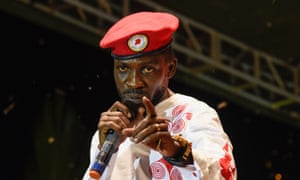
Ghetto presidents': musicians risk all to take on authoritarian rule in Africa
Artists taking on political roles from Algeria to Zambia have been beaten, detained and killed
Jason Burke in Johannesburg and Samuel Okiror in Kampala
Bobi Wine
The Ugandan reggae star Bobi Wine hopes to unseat his country’s ruler of 35 years, Yoweri Museveni, in presidential elections next year. Photograph: Isaac Kasamani/AFP/Getty Images
They call him the “ghetto president”, and his ambition is to bring the dreams and the sounds of the streets to the corridors of power.
Bobi Wine, a popular reggae star and prominent opposition MP in Uganda, will release a new album next month that addresses what he calls “the real issues people are facing – the injustices, corruption, high taxation, misrule, abuse of human rights, dictatorship.”
“
Rise up, African musicians, and we can accomplish the task,” Wine said in an interview. “We can’t be defeated. The more they oppress us, the stronger we become. No dictator in history has ever defeated the artists and no one will ever.”
Bobi Wine gives a news conference in Kampala
FacebookTwitterPinterest
Bobi Wine gives a news conference in Kampala in July 2019.
Photograph: James Akena/Reuters
The 38-year-old, whose real name is Robert Kyagulanyi Ssentamu, hopes to end Yoweri Museveni’s 35-year rule in a presidential election scheduled for early next year. He is the most prominent but far from the only artist in Africa who aspires to swap the musical stage for a political one.
From Senegal to Kenya to Algeria and the Democratic Republic of the Congo (DRC), a new generation of artists is giving voice to the grievances and aspirations of hundreds of millions of people.
“Artists and musicians have a genuine connection with the people and that is what scares the elites and the powerful,” said Fumba Chama, a Zambian activist and hip-hop star who performs as Pilato.
Pilato takes part in a protest against corruption in Lusaka in September 2018
FacebookTwitterPinterest
Pilato takes part in a protest against corruption in Lusaka in September 2018.
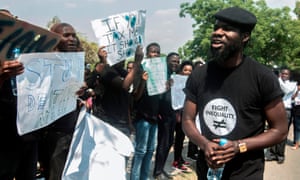
Photograph: Salim Dawood/AFP via Getty Images
Experts say, however, that the artists face huge obstacles to gaining political power, and that the efforts of Wine and others to upend the political status quo may serve more to underline problems rather than resolve them.
Advertisement
Wine broke into formal politics in 2017 when he won a seat in Uganda’s national assembly.
He has been since been badly assaulted and detained many times. With political rallies banned in Uganda due to concerns about the spread of Covid-19, he has also been denied his most powerful political weapon.
“Initially we were communicating our message through music and art. They have gone ahead to put in place very inhuman and unreasonable regulations and rules on creative art,” he said.
Now, he added, “we are running our campaign in a rub-a-dub style. We show up impromptu in places, we address the people, tell them about our agenda and we disappear before the police show up. So we are operating like rebels. We are actually non-violent rebels.”
Few musicians on the continent share either Wine’s ambitions or his achievements.
The hugely successful rapper, singer and actor Banky W – real name Olubankole Wellington – stood in elections in Nigeria last year. He promised to inspire a young generation to bring sweeping change to a country struggling with systemic corruption, poverty and extremist violence.
Banky W (centre) at a campaign rally in Lagos in January 2019
FacebookTwitterPinterest
Banky W (centre) at a campaign rally in Lagos in January 2019. Photograph: Florian Plaucheur/AFP/Getty Images
Despite a huge following on social media, however, he failed to win a seat, defeated by the son of an influential former minister who stood for the ruling party.
Sign up for the Sleeve Notes email: music news, bold reviews and unexpected extras
Read more
Lexxus Legal, a popular rapper whose socially aware songs have won him a large following, stood as an opposition candidate in the DRC’s national elections in late 2018, but he also failed to win a seat. The election results were marred by credible allegations of widespread fraud. 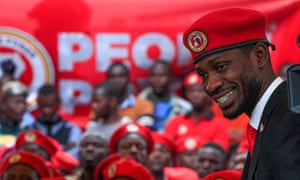

Nic Cheeseman, a professor of democracy at the University of Birmingham and an analyst of African politics, said attracting big audiences with music was very different to winning elections.
“It’s a mistake to dismiss a ruling party with … a lot of power and resources, and to underestimate how strong, how resilient the party and state are, and what you need to overcome them,” he said.
African musicians have long played political roles, both praising and challenging those in power. Hugh Masekela and Miriam Makeba were at the forefront of the struggle against apartheid in South Africa, and Fela Kuti’s scathing criticism of Nigeria’s military rulers earned him more than 200 arrests and various beatings.
Hugh Masekela on stage in 1980
FacebookTwitterPinterest
Hugh Masekela on stage in 1980. Photograph: Christopher Bierlein/Redferns
Falz, a lawyer turned rapper from Lagos, has been compared with Kuti after releasing songs that excoriate his country’s political class. His 2018 song This is Nigeria attracted millions of views on social media, and he has 1.4 million followers on Twitter.
Advertisement
“There has been a robust relationship between musicians and political movements in Africa for 100 years or more,” said Zachariah Mampilly, a professor at the City University of New York. “What we are starting to see is musicians not just participating in social movements but actively participating in political processes … at a higher level.
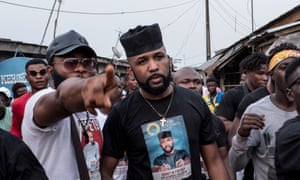
“There have been waves of protest across Africa. Individuals are almost pushed into a political role by their followers. Young people turn to musicians as their voice and the musicians are asking themselves: is it enough to just do music?”
Pilato said he would not rule out a move from social activism to politics. “I’m confident I can still inspire change as an artist but the future is a blank page. If I saw that being an artist was not enough and was no longer effective, perhaps,” he said.
Pilato is arrested at a rally in Lusaka in September 2017
FacebookTwitterPinterest
Pilato is arrested at a rally in Lusaka in September 2017. Photograph: Dawood Salim/AFP via Getty Images
Pilato has been harassed and detained and has received death threats from government loyalists. In Africa’s more repressive states, the risk of arrest and mistreatment is high. Tanzania’s highest-selling artist, Diamond Platnumz, had two of his songs banned in 2018 and was held for allegedly indecent social media posts.
Other musicians have remained outside formal politics but become leaders of ethnic communities.
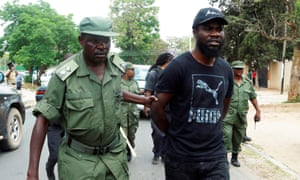
One of the most prominent was Hachalu Hundessa, a popular Oromo singer and activist in Ethiopia. He was murdered last month, and the killing led to days of unrest in which more than 150 people died.
“Musicians are critical and can be powerful voices and, as threats, need to be neutralised … I think that’s what we saw in Ethiopia,” said Mampilly.
Wine’s new album will shake the authorities in Uganda, he said. “They know what music has done to various dictatorships in Africa and they know what music will do to them … It’s the art in Africa that has always dared to bring out the best in us [despite] suffocation by dictatorships and powers that be.”
No comments:
Post a Comment